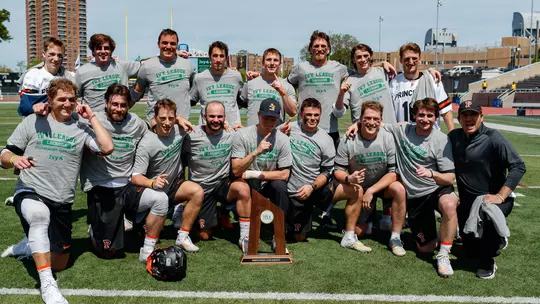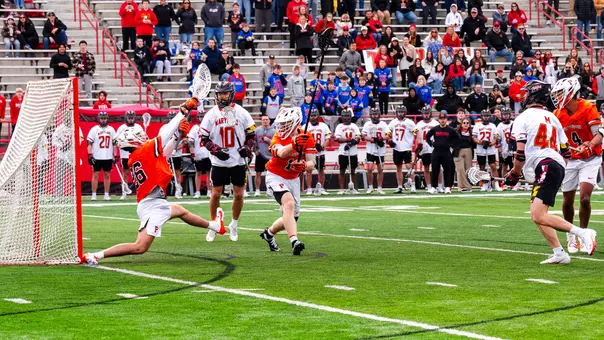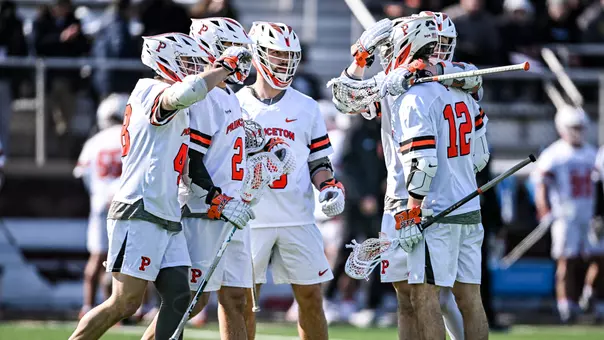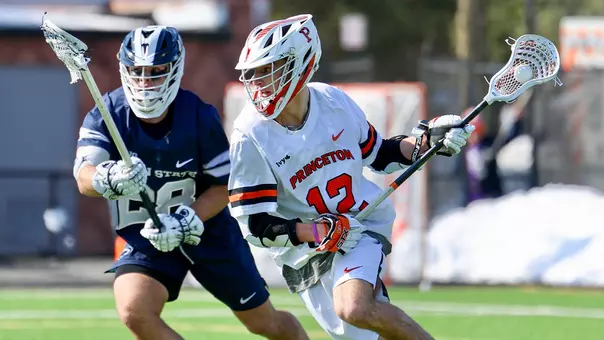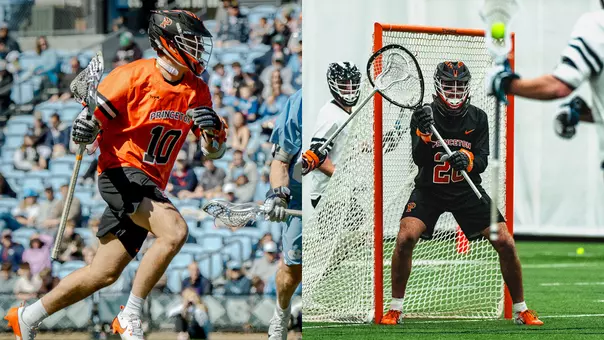Princeton University Athletics
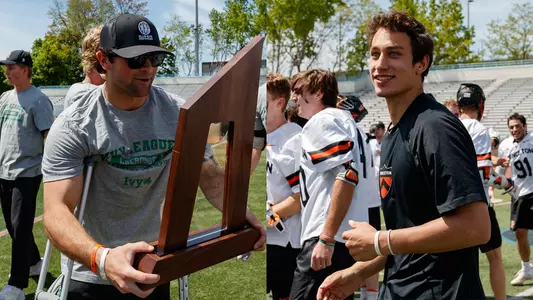
Feature Story: Hurt, But Still Here
May 09, 2023 | Men's Lacrosse
Sam English is down on one knee on the Lawrence A. Wien Stadium sideline. It’s the championship game of the Ivy League men’s lacrosse tournament, Princeton against Yale, in a game the Tigers must have to get into the NCAA tournament.
In front of English, the Princeton men’s lacrosse offense is whipping the ball around, but he’s not satisfied.
“Move it through X,” he yells. “Camo. Camo. Clear. Hey. Get through.”
He does this for about 20 seconds, non-stop, one command barked after another. Finally, he starts to get up. As he does, he turns away from the field.
“Goal,” he whispers.
About three seconds later, that’s just what Princeton gets. A goal. Just as English called it.
Next up is a face-off. Tyler Sandoval snaps to attention, grabbing not a lacrosse stick but instead his crutches. Having analyzed every possible move and counter-move, Sandoval is now sharing what he knows with Andrew McMeekin, Princeton’s freshman face-off man.
Princeton defeated Penn 9-8 and Yale 19-10 to win the Ivy tournament and will now travel to Penn State for Sunday night’s opening round NCAA game (face-off at 7:30). Neither English nor Sandoval stepped across the sideline during the tournament. Their roles were strictly supporting.
Make no mistake, though. These two are invaluable to the Princeton men’s lacrosse success, as much as if they had been the ones scoring the goals or winning the face-offs. Without them, Princeton’s season would be over by now.
“They are extraordinary young men who are showing what kind of teammates they are,” says Princeton head coach Matt Madalon. “They’re also showing you what kind of people they are. It takes everyone in our program. We have had so many injuries, but every one of those guys who can’t play is doing something to help make us better.”
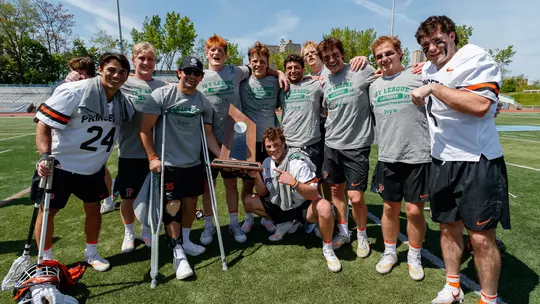
It has been a season of injuries. That’s for sure. It’s part of what makes the Tigers’ success such a team effort. Luc Anderson, a top shortstick defensive midfielder, is out with a broken wrist. Braedon Saris, a starter on attack, has been limited to basically 3.5 games due to two different ankle injuries. Alex Slusher, also a starter on attack, had to miss time with an injury; his replacement, Jack Ringhofer, then got hurt. Freshman Ian Mize, who would have seen time in the midfield, has missed the entire season. There are others who have been unable to go as well for various lengths of time.
In the case of English and Sandoval, they are both All-American talents. English was a preseason Tewaaraton Award Watchlist selection who is one of the best all-around midfielders in college. Sandoval put up Princeton’s best face-off numbers in 20 years a season ago. Together they were key reasons why Princeton played all the way to Memorial Day weekend. Both are what you would call “high lacrosse IQ” players.
They’re also the ones who had the most severe of all the injuries. Unable to play, they have both jumped into roles as quasi-coaches, and they have both excelled in their new positions.
“It’s the next man up,” English says. “It’s exciting. It’s exciting to see the younger dudes step up. We have a lot of dudes who can play.”
English uses the word “dudes” a lot. He punctuates his sentences with quick bursts of laughter. He speaks with great confidence. If you didn’t know that he was from Canada, you’d be willing to bet he was from Southern California.
Sandoval, on the other hand, is somewhat professorial in his responses. He never answers right away. He thinks and processes, and only then does he reply.
“How hard has it been not to be able to play?” he is asked. It’s a good five seconds before he speaks.
“There was a period of three days, maybe less, of disappointment,” he says. “Then it changed. Then my mission became that I would do anything and everything I could to get back to playing with the team, and at the same time, how could I benefit the team now? What’s the best thing I could do to help?”
Sandoval was the first of the two to be injured. He went down early in the regular season game against Yale, on a day when Princeton would win 23-10. It was on his second face-off of the day. He planted, and his knee gave out.
“George [O’Neil, the athletic trainer] came out onto the field and did the ACL test,” Sandoval says. “I was looking up at the sky. I felt my tibia go forward, and I knew that my ACL was gone. I cried twice. The first time was back in the team room. I was with my parents, and I was crying. I even laughed a little. I was a bit delirious to be honest. That was the first time. Then I crutched my way back onto the field and we were up 6-1 or 7-1. I cried a little then too, in secrecy. The guys were continuing to get it done. That’s when I knew what my new mission was.”
Sandoval was correct that his ACL was torn. He’d have season-ending surgery two weeks later. He completely hates everything about his crutches, but his lack of mobility hasn’t prevented him from being as constant a presence as he can with the other three face-off men — McMeekin, Koby Ginder and Jim Williams.
“As the acute pain resided and I was able to move around more efficiently, the feeling sorry stuff all disappeared,” Sandoval says. “People come up to me and say ‘I’m sorry. I’m so sorry about what happened to you.’ I’m not sorry. It’s not something to feel sorry about. It’s a journey of growth. It’s a learning experience. I’ve had three surgeries in my life, and I’ve come out a better person each time. My teammates know I don’t want them to feel sorry for me. It was a quick switch. I can’t be the face-off guy? Okay, how can I make our face-off guys better?”
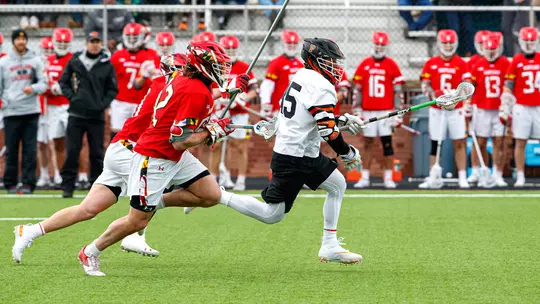
The face-off position is a unique one. At practice, you can see the offense here, the defense there — and the face-off guys off by themselves. It’s a little like going to a football practice, where the punters and kickers are off by themselves too.
There are also only so many times the face-off guys can practice against each other. Much of their time is spent talking, analyzing, watching video, trying to get any edge.
“We have an open dialogue,” Sandoval says. “A lot of improvement is done through that dialogue. It’s a very theoretical position. If I can help, that’s my role now. I’ll help any way I can.”
His impact on McMeekin, who has taken the majority of face-offs since Sandoval’s injury, is obvious.
“Tyler has always been incredibly helpful to me,” McMeekin says. “He was a great teammate when he was healthy. As his injury sidelined him, he’s made it his No. 1 priority to do as much as he can in practice and games to give pointers and critiques to all of our face-off guys. That’s how he’s helping the team even when he can’t be on the field. He also somehow manages to still bring his normal energy and personality to every event we have, and it really keeps the face-off unit up no matter what the circumstance is.”
It was crystal clear at the Ivy tournament, where McMeekin made the All-Tournament team after winning 26 of 50 face-offs with 18 ground balls. He started the final by winning the face-off and feeding Alex Slusher for a goal six seconds in, for the fastest goal to start a game in program history. He won seven of the first 10 as Princeton built a huge first-half lead, sprinting out to leads of 7-1 in the first quarter and 13-2 in the second.
The key moment of the entire tournament for Princeton, though, was in the final 13 seconds of Friday night’s game. On a night when defenses were dominant, Princeton seemed to be in control up two with the ball in the final 30 seconds, until Penn got a stop, a clear and a goal. Suddenly it was 9-8 Tigers with just those 13 ticks to go. Timeout Penn.
For the entire two minutes of the timeout, Sandoval was next to McMeekin. The situation was obvious — win the face-off and that would be the game; lose it and Penn had a shot to tie and force overtime, something Princeton is 0-3 in this season.
“There’s something I always says,” Sandoval says. “I used to say it even to [Michael] Sowers. I’d say ‘what’s the score; what’s our record?’ They all know that the answer is ‘0-0.’ That 0-0 mentality is what you need. I told him ‘look, it’s 0-0. Play smart. Trust yourself.’ I gave him my input of what I would do.”
McMeekin won the draw cleanly, maintained possession and got it to Beau Pederson, who was slashed. Game over.
“I was so proud,” Sandoval says. “I can’t even put it into words. For a young guy to rise to the occasion like that? It was just an excellent play to settle the game.”
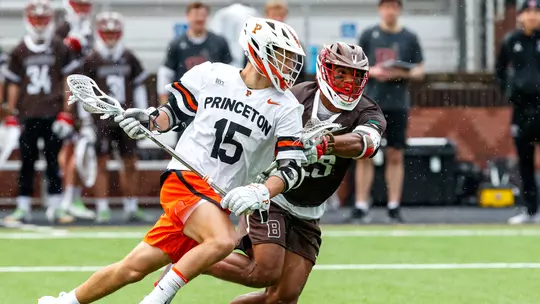
English was injured two weeks after Sandoval, on the very first play of the game against Syracuse. English is a dynamic player. His best move is a sweep to his right across the top of the defense and then a quick release. It’s a move that earned him All-American honors in 2022, when he put up 30 goals and 18 assists. Scoring is not his only skill. He was a defensive midfielder as a freshman, and he’s a great ballcarrier as well. He’s the kind of player who inspires confidence no matter the situation.
Against Syracuse, English had just stepped on the field for the first time. The game was barely 30 seconds old. He moved strongly to his right and as he turned towards the goal, he collided with a Syracuse defender. He came off the field holding his side, in a way that made it look like he’d broken his collarbone.
For his part, he thought he might have a concussion, since he had similar symptoms. He would eventually be taken to Princeton Medical Center, where he learned that his spleen had been ruptured. It would be four nights in the hospital before he would leave.
“It’s tough,” English says. “Just like that your season is over. You can’t dwell on it. You can’t feel bad for yourself.”
Princeton’s next game after the injury was at Dartmouth. When English first got out of the hospital, he had to hold his side when he walked. He used a stick as a cane.
“We were coming off a loss to Syracuse,” he says. “We were playing a game we had to win. Coach Mitch [offensive coordinator Jim Mitchell] told me ‘I need your help here.’ I pretty quickly realized that just because I was hurt, my value-added to the team didn’t need to be zero. The Wednesday or Thursday I was out of the hospital, I was trying to help these dudes. Jackson Kane, a freshman, I spent a lot of time talking to him, talking to the other dudes.”
When the bus rolled out of Princeton that Friday, English was on it. That was the first game where his was a constant voice on the sideline, helping direct the offense in a way he would have were he on the field.
“I try to do whatever I can,” he says. “It’s not just for the team. It’s also for my own mental well-being. It allows me to feel better about the whole situation.”
English is much more vocal on the sideline than Sandoval. He is animated. His voice carries. He sees everything. Twice in the Yale game, he called a goal seconds before it happened.
“It’s obviously different than being an actual coach,” he says. “Coach Mitch is pretty locked into the game. For me, it’s a bit different. I think I’ve gathered some respect from these guys. I’m just having a conversation with the middies on the sideline. What do you see? How’s it going? What should we run next? When the ball is moving, and I see something, I can think ‘here we go; it’s looking good.’ It’s fun.”
Sean Cameron, a sophomore, moved into the starting lineup in English’s place after the injury. Cameron had four goals for the season prior to when English was hurt; he has 11 since, including three against Yale in the championship game and a goal and assist against Penn in the semifinal. Like McMeekin, he was also selected to the All-Tournament team.
“He continues to lead the offense,” Cameron says of English. “Whenever we get the ball on the offensive side, he’s telling us the best plays to start in, communicating with us from the sidelines, giving advice when I’m back on the bench. It’s not easy to fill the shoes of an All-American, but he’s been so supportive, helping me on and off the field. He is equally as impactful in helping the offense flow.”
To give you an idea how good English is, it’s been five games since his injury, actually six, since he played for about 10 seconds against Syracuse, and yet he still ranks third on the team in assists and fifth in points.
“This wasn’t the season I was ready to have or wanted to have,” he says. “My confidence was high coming into the year. Being on the sideline Friday and Sunday, even if I wasn’t playing, it still felt amazing to be able to be helpful.”
The NCAA tournament is next. Princeton is back in it for the second-straight time, this after its celebration of its Ivy League tournament title this past weekend. It’s a team with confidence, and it’s also, thankfully, a team with depth.
“We’re peaking at the right time,” English says. “We’ve taken a totally different route to the tournament this year than last year [when the team missed the Ivy tournament, got an at-large bid and won twice to get to Championship Weekend]. Winning the Ivy championship game gave us all a taste of a trophy. There’s great value in that, in knowing how to win big games. We’re all excited for what’s next.”
When McMeekin came off the field after he sealed the game against Penn with his big face-off win, there was about a minute or so before play started again as the officials sorted out the penalty. Sandoval walked over to him and gave him a huge embrace. English followed with an arm around him. He probably said something like “great job, dude.”
At this time of year, it takes everyone to make your team a winner. Everyone has a role to play.
Sometimes, it’s not the role your stars figured to have. Sometimes their destiny is something nobody would have guessed.
— by Jerry Price
